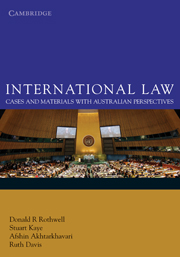Book contents
- Frontmatter
- Contents
- Preface
- About the authors
- Acknowledgements
- Table of cases
- Table of statutes
- Table of treaties and other international instruments
- Abbreviations
- 1 The nature of international law
- 2 Sources of international law
- 3 Law of treaties
- 4 International and municipal law
- 5 International legal personality
- 6 Sovereignty over territory
- 7 Jurisdiction
- 8 State responsibility
- 9 Human rights
- 10 Law of the sea
- 11 International environmental law
- 12 Enforcement of international law
- 13 The peaceful settlement of international disputes
- Index
- References
8 - State responsibility
- Frontmatter
- Contents
- Preface
- About the authors
- Acknowledgements
- Table of cases
- Table of statutes
- Table of treaties and other international instruments
- Abbreviations
- 1 The nature of international law
- 2 Sources of international law
- 3 Law of treaties
- 4 International and municipal law
- 5 International legal personality
- 6 Sovereignty over territory
- 7 Jurisdiction
- 8 State responsibility
- 9 Human rights
- 10 Law of the sea
- 11 International environmental law
- 12 Enforcement of international law
- 13 The peaceful settlement of international disputes
- Index
- References
Summary
Introduction
States are not individuals, but rather are human-created entities that consist of people. Clearly a State can only commit a wrongful act in international law through individuals acting for it, on its behalf, or through being responsible for the behaviour of their citizens. State responsibility as an area of international law is most significant, but curiously it is still the subject of much debate as to its content. From as early as 1969, the International Law Commission (ILC) began working on the problem of State responsibility. The project to produce an international convention outlining the rules with respect to State responsibility proceeded through a number of drafts, a name change, and significant debate within both the ILC and the international legal community. The result was the eventual adoption by the ILC of the Articles on Responsibility of States for Internationally Wrongful Acts on 9 August 2001. While often referred to as the ‘Draft Articles’, reflecting the lengthy process of ILC deliberation over various drafts across nearly three decades, following the noting of the ILC's work by the UN General Assembly in December 2001 the term ‘Draft Articles’ is no longer widely used. Nevertheless, the Articles on Responsibility of States for Internationally Wrongful Acts, while having the appearance of a treaty, are unlikely to ever become fully endorsed as part of a convention on State responsibility. However, most of the ILC's Articles are widely accepted as being reflective of customary international law.
- Type
- Chapter
- Information
- International LawCases and Materials with Australian Perspectives, pp. 378 - 443Publisher: Cambridge University PressPrint publication year: 2010



